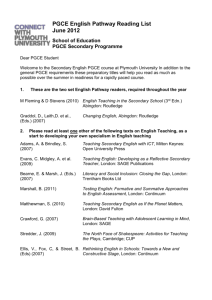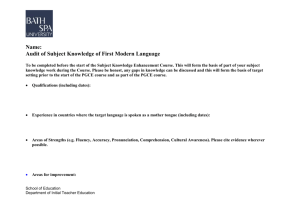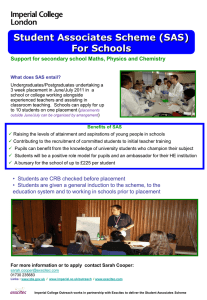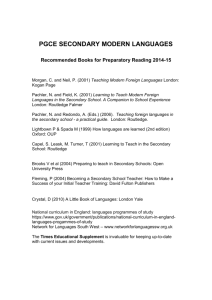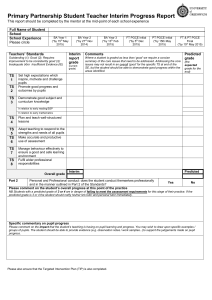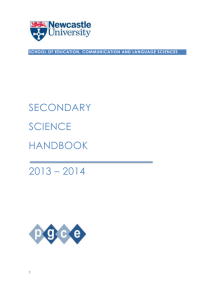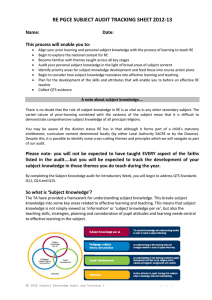PGCE Secondary English: how to prepare for the course
advertisement
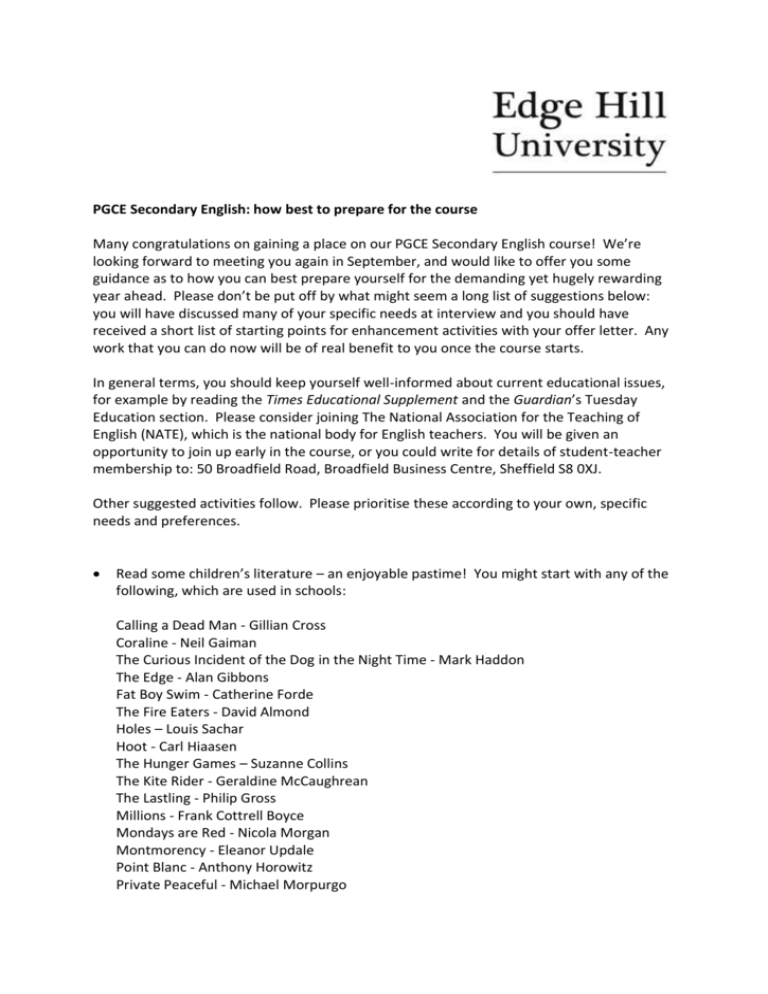
PGCE Secondary English: how best to prepare for the course Many congratulations on gaining a place on our PGCE Secondary English course! We’re looking forward to meeting you again in September, and would like to offer you some guidance as to how you can best prepare yourself for the demanding yet hugely rewarding year ahead. Please don’t be put off by what might seem a long list of suggestions below: you will have discussed many of your specific needs at interview and you should have received a short list of starting points for enhancement activities with your offer letter. Any work that you can do now will be of real benefit to you once the course starts. In general terms, you should keep yourself well-informed about current educational issues, for example by reading the Times Educational Supplement and the Guardian’s Tuesday Education section. Please consider joining The National Association for the Teaching of English (NATE), which is the national body for English teachers. You will be given an opportunity to join up early in the course, or you could write for details of student-teacher membership to: 50 Broadfield Road, Broadfield Business Centre, Sheffield S8 0XJ. Other suggested activities follow. Please prioritise these according to your own, specific needs and preferences. Read some children’s literature – an enjoyable pastime! You might start with any of the following, which are used in schools: Calling a Dead Man - Gillian Cross Coraline - Neil Gaiman The Curious Incident of the Dog in the Night Time - Mark Haddon The Edge - Alan Gibbons Fat Boy Swim - Catherine Forde The Fire Eaters - David Almond Holes – Louis Sachar Hoot - Carl Hiaasen The Hunger Games – Suzanne Collins The Kite Rider - Geraldine McCaughrean The Lastling - Philip Gross Millions - Frank Cottrell Boyce Mondays are Red - Nicola Morgan Montmorency - Eleanor Updale Point Blanc - Anthony Horowitz Private Peaceful - Michael Morpurgo Shadow of the Minotaur - Alan Gibbons Stone Cold – Robert Swindells Stormbreaker - Anthony Horowitz Thursday’s Child - Sonya Hartnett Tribes - Catherine MacPhail Unique - Alison Allen-Gray Witch Child - Celia Rees Wolf Brother - Michelle Paver (If you know any 11-16 age children, ask them about their favourite school readers, and read those, too.) Familiarise yourself with the National Curriculum for English at key stages 3 and 4, which you can access at: https://www.gov.uk/government/publications/national-curriculumin-england-english-programmes-of-study. This is the newly revised curriculum (for implementation in September 2014); you might want to download it, although we will provide you with a hard copy when you start the course. Choose some reading from the National Curriculum list of authors for Key Stage 3 and 4, including Shakespeare, pre-1914 poetry and fiction and contemporary literature, including seminal world literature. Popular texts for Shakespeare study in school are Macbeth, Much Ado about Nothing , The Tempest, Richard III, A Midsummer Night’s Dream, Julius Caesar, 1 Henry IV, Romeo and Juliet and The Merchant of Venice. Visit a local secondary school – a must, if you haven’t already done so - and feel what it’s like to sit in an English class again. Talk to English teachers, and find out about what the demands – and pleasures - of the job are. Our course focuses on 11-16 age phase, but you will take part in post-16 enhancement activities. You might, then, look at an AS or A2 level exam syllabus for English Language and Literature, read some of the set texts and access exam board websites such as www.wjec.co.uk and www.aqa.org.uk , which are useful for syllabus materials and descriptions. After your visit(s), make brief reflective notes on effective teaching and learning strategies at each key stage, and record your own thoughts about how children can be engaged and motivated in English lessons. Begin to familiarise yourself with the Teachers’ Standards (2012). When you arrive in September, one of your first tasks will be to work on an assignment which addresses a weaker area of your subject knowledge. Begin this assignment now, by auditing your subject knowledge. In order to do this as simply as possible, you will need to buy a workbook: Johnson, A. (2003 2nd edition) English for Secondary Teachers: An Audit and Self-Study Guide (Letts) ISBN 1 85805-353-6. Once you know which areas to enhance, draw up, and begin working on, an action plan to do so. There’s a simple template at the back of the book, which you can copy, and on which you can record your action plan, action taken and progress. Please keep records for review with your tutors in September. One other book which we would ask you to buy is: Evans, C. et al (2009) Teaching English: Developing as a Reflective Teacher of English (Sage). It is full of appropriate information, ideas, approaches and thought-provoking issues. It is also eminently readable, and will be used in some seminars. Other suggested pre-course reading – some recommended by this year’s trainees – includes: General: Clarke, S., Dickinson, P. and Westbrook, J. (2004) The Complete Guide to Becoming an English Teacher. Paul Chapman Publishing Davison, J. and Dowson, J. (eds) (2009) Learning to Teach English in the Secondary School, Routledge Falmer Davison, J., and Moss, J. (2000) Issues in English Teaching. Routledge Cowley, Sue (2007) Getting the Buggers to Behave Continuum (look out for other titles by Sue Cowley) Wright,T. (2008) How to be a Brilliant Trainee Teacher. London: Routledge Language: Barton, G. (2010) Grammar survival: a teacher's toolkit. London: Fulton Crystal, D (2004) Rediscover Grammar. Longman Literature: Littlewood, I. (2006) The Literature Student’s Survival Kit: What Every Reader Needs to Know Blackwell Stredder, J. (2004) The North Face of Shakespeare: Activities for teaching the plays Wincot Press These books are generally available in good libraries, and you are not required to buy them. You might also want to access some useful websites, such as www.teachit.co.uk which contains an excellent Resources Library with a huge range of teaching resources and materials uploaded by colleagues in schools. You will need to be a confident and competent user of Information and Communications Technology by the end of the course. We will help you to develop these skills, but it will be helpful if you can become computer-literate in word-processing, desk-top publishing, databases, spreadsheets, internet searching and audio / video recording before the course starts. Finally, if you know that you have a weakness in terms of grammar, spelling and/or punctuation, please address it before the course starts. As an English teacher, you will be expected to be an exemplary role-model, in these respects, to the pupils and students whom you teach. Many workbooks and websites are available: please start now! I hope that you won’t see this as an exhaustive (or exhausting) list of tasks. The crucial point, at this stage, is that you come to the course feeling confident in your own subject knowledge, with a genuine passion for teaching English and an enthusiasm for the course. If you have any queries between now and September, please don’t hesitate to contact us. We look forward to welcoming you to the PGCE English Course! Natalie Reynolds PGCE Secondary English Course Leader 01695 650 766 reynoldn@edgehill.ac.uk PGCE Secondary English: Primary Placement Reflections This is to guide your record of reflections and learning from your placement in a Key Stage 1/2 school. You should use the questions below as a guide for your writing, but don’t see them as restrictive or definitive – please add to them as you wish. Please record your responses briefly in writing (no more than 3 x A4 sides, normally). Call your document ‘Primary Placement Reflections’ –- and bring this record to the Primary Placement Review session early in the course. 1. Which age groups did you observe? 2. Were the classes streamed/ setted/ mixed-ability/ mixed-age? Were groupings formed and re-formed at different times of the day? How well did the chosen arrangements work? 3. What classroom management strategies did you observe? Which seemed to ‘work’ best? 4. How did pupils seem to feel about education and school generally? 5. What did you find out about systematic synthetics phonics and how teachers feel about its impact on overall teaching and learning? 6. What did you find out about the Year 1 Phonics Tests? 7. What did you find out about the Key Stage 2 SATs? 8. List all the ways in which the school tried to encourage reading. What ‘worked’? 9. What evidence did you get to support or refute the idea that boys enjoy reading less than girls? 10. What evidence did you get to support or refute the idea that girls ‘do better’ than boys in writing? 11. What were your reactions to literacy sessions observed? Do you think that the approach to literacy helped pupils to learn? 12. Record any evidence that literacy and/ or numeracy skills are targeted across the primary curriculum. 13. How was written work marked? How effective do you think this was in helping individuals to make progress? 14. How much were pupils encouraged/ given opportunities to develop learning through speaking and listening activities? 15. What do you see as the two main issues which pupils have to face when transferring from primary to secondary schools? Note down any ways in which you saw the school trying to address these issues, in advance of the transfer. 16. Note down anything you observed, which you think would be effective if copied in secondary schools. 17. In what ways do you think this placement was relevant to you as you start your training in secondary schools? 18. Finally, note down the relevant Teachers’ Standards which has/have been particularly addressed by your completion of your primary placement.

